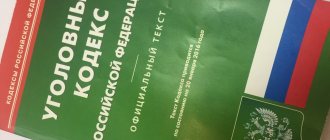In Art. 292 of the Criminal Code of the Russian Federation defines the concept of official forgery, and lists possible options for sanctions for committing such a crime.
Forgery is defined as the provision of knowingly false information or the deliberate introduction of changes to official documents that distort the essence and meaning. It doesn’t matter what type of document it is: forgery can be carried out on paper or electronic media.
Often when using the term official forgery, people put into it a meaning that is somewhat different from the true understanding. What is the essence of this action, how forgery is determined, the possibility and purpose of the commission, and what punishment the crime may entail, we will consider in this article.
Motives
The motive may be obtaining material benefits or any privileges, patronage, future loyalty from management, or inflating results for the sake of prestige.
The interest of the person committing the forgery may be personal in nature, or the subject may be seeking benefits for others.
When a fact of forgery is detected, the desired results are not taken into account, just as the actual non-use of the results of falsification is not taken into account. The forgery is considered committed at the moment the amendments are completed.
Abuse of official powers (Article 285 of the Criminal Code)
This crime is associated with the use by a citizen of his powers contrary to the goals of his official activities with a selfish motive, which leads to harm to citizens, companies and the state.
For the crime to end, dangerous consequences must occur.
For example, a person issues a driver’s license to a person who has not passed the test, or puts a citizen in line for preferential housing without grounds.
An important sign of such a criminal act is the presence of selfish or other personal interest.
As explained by the Supreme Court of the Russian Federation, in Resolution No. 19 of October 16, 2009, selfish interest is the intention to obtain property benefits that are not related to the gratuitous acquisition of property (illegal receipt of benefits, exemption from debt repayment, taxes, etc.). Another personal interest is associated with the desire to obtain a non-property benefit (mutual favor, support in resolving an issue, etc.).
More details about the act under Art. 285 of the Criminal Code of the Russian Federation, read the article.
Object and subject
When understanding the situation, you should separate the concepts of “object” and “subject”.
The object of the crime is state interests, in terms of the performance by government agencies of their functions, and the subject is official acts and resolutions regulating or confirming the results of this activity. The commission of a crime that interferes with the normal functioning of any state or municipal institution is the objective side of the crime.
In this case, not every document can be the subject. The storage medium must meet specific requirements. We are not talking about the material of the carrier, but about its quality side.
The subject matter is considered official acts: legally significant federal or territorial official decrees or documents related to them. Which can be either outgoing or incoming, provided that they have undergone official registration.
Material on the topic: Forgery of documents, Article 327 of the Criminal Code of the Russian Federation: punishment for the offense
The following requirements apply to documents offered as a subject:
- The act must certify the specific results of events of legal or economic significance. Moreover, it can be of a permissive or prohibitive nature.
- A mandatory feature is the presence of details: date of preparation, stamp of the authority or organization, incoming or outgoing registration number, signature indicating the position, surname and initials of the person who compiled the document, seal.
Important point
When considering official forgery (Article 292), one should not allow confusion of such concepts as “object” and “subject” of the crime. The latter is primarily material evidence. The subject, according to many experts, is largely a procedural definition. Art. 81 of the Code of Criminal Procedure directly refers to material evidence as objects that became instruments of a crime or have traces of it preserved on them. There is a reference to the object of the encroachment, but its very concept needs to be clarified. In particular, if the appearance of a thing changes, then it acquires the characteristic of evidence of an event or often of guilt - a direct product of the act and pointing to it as the cause of the crime.
Objective side
There are two options to commit forgery:
- drawing up documents, regardless of their form, with deliberately distorted facts;
- make corrections to the informative part by adjusting or distorting the content of the text.
Methods of committing forgery are usually divided into intellectual and material. In the first case, we mean the production of a new document on company letterhead containing false information. In the second method of execution, changes are made to an already existing official document.
Assignment of powers of another person (Article 288 of the Criminal Code of the Russian Federation)
The objective side of the crime is the misappropriation by a civil servant or municipal employee who is not an official.
For example, a person conducts an inspection, although he is not vested with such a right.
To recognize the presence of a crime, grave consequences must occur, otherwise such an act will only be qualified as a disciplinary offense.
Misuse of budget funds (Article 285.1 of the Criminal Code of the Russian Federation)
The subject of such a crime is budgetary funds. The objective side is expressed in the expenditure of budget funds for purposes that do not meet the conditions for receiving these budget funds, committed on a large scale (over 1 million 500 rubles).
The corpus delicti is formal. The crime is completed from the moment budget funds are directed to purposes not provided for by the relevant document - from the moment they are written off from the personal account of the budget institution.
Establishment of fact
It is not always possible to establish the fact of forgery when an official document is discovered.
When determining the source of receipt of a document, it is important to determine the person who compiled it and determine whether the subject had the authority to draw up and sign the act. If these actions are not part of his official duties, then it will not be possible to qualify the act as forgery. In such a situation, or when falsifying an unofficial document, the actions of the subject fall under Article 327 of the Criminal Code of the Russian Federation. It is quite possible that both articles will compete.
To establish the elements of a crime, it is not necessary to establish the consequences of using an illegitimate document. The act is recognized as committed upon completion of the act of making false changes or deliberately drawing up an incorrect document.
The subsequent fate of the document, its use in any authorities or for any purposes is not commented on by Article 292. But the size of the consequences and their effect (it may turn out to be positive) are taken into account when determining the severity of the punishment.
Material on the topic Comments on Article 306 of the Criminal Code of the Russian Federation for knowingly false denunciation
Most often, official forgery is carried out to achieve some goal, to commit or conceal an action that has already been committed, usually illegal. In such a situation, the subject will be held liable for both crimes simultaneously. Or for forgery and preparation for another illegal act, if the commission was prevented.
Differentiation of compositions
The offense in question may have competing crimes. This may create some difficulties for law enforcement. This problem becomes particularly relevant in cases where officials are the subjects of the crime. For example, difficulties arise when acts fall under Art. 285. Official forgery in this case can be used as a means of expressing abuse of power. However, when qualifying under standard 285, consequences must occur. They are given in the dispositive part of the article. The elements of abuse are defined by law as material. If an act is considered under Art. 286, then in addition to the indicated consequences, it is necessary to establish the fact of abuse of official powers.
The most difficult case in the practice of investigation and legal proceedings may be the case of distinguishing official forgery from bribery. The actions of the bribe giver in some situations can be expressed in this way. When establishing the selfish nature of an official’s behavior, questions may arise regarding qualifications for the totality of actions. It seems that in such situations it is advisable to be guided by the provisions of Art. 17 in part 3. They indicate that if an act falls under a general and special norm, then there is no combination of them, and criminal liability will arise according to the latter. A crime covered by Art. 292, when committed by an official in the circumstances formulated in the dispositive part of Art. 290, qualifies under this article.
Possible consequences
The article defines a fairly wide variability of punishment. Depending on the consequences of using a falsified document, the judge may pronounce a sentence and impose a punishment in the form of:
- a fine in the amount of 100 to 200 minimum wages or in an amount equal to the subject’s salary for 1 or 2 months;
- undergoing compulsory work for a period of up to 240 hours;
- correctional labor for a period of 12 to 24 months;
- imprisonment for up to 2 years.
Depending on the severity of the consequences of forgery, the statute of limitations for this crime expires after a maximum of 6 years. Fraud is rarely an independent crime.
Official forgery is unique in terms of the subject committing criminal acts. They can be an employee of a government agency at any level. On the part of the subject, the presence of direct intent is always visible, namely, the knowledge of the subject’s actions. Personal direct interest (financial or moral) is a mandatory sign of the subjective part of the forgery.
Comments
Official forgery (Article 292 of the Criminal Code) is considered a crime against state power. It differs from other criminal acts, the punishment for which is formulated in Chapter. 30 of the Code. First of all, such a crime can only be committed by a special subject. This could be an official, a civil servant, or an employee of a local government agency. From the subjective side, official forgery is characterized by the presence of exclusively direct intent on the part of the perpetrator. The disposition of the norm specifically indicates this circumstance—the knowledge of a person’s actions. In addition, personal interest or self-interest acts as a mandatory sign of the subjective side.
Nuances
So, intent or motive is an integral sign of forgery. There will be no corpus delicti if intent is not proven.
The fact of a criminal act is considered committed at the moment the distorting amendments are completed or the writing of a false official document is completed, it does not matter whether the amendments were subsequently canceled or the documentation was confiscated. When considering this circumstance, it is necessary to take into account that the entry into the official register of invalid data, which is the basis for registration of citizenship, is an action falling within the area regulated by Art. 292.1 in part 1 of the Criminal Code of the Russian Federation.
In fact, these are two criminal acts: official forgery, which became the basis for the illegal issuance of a passport of a citizen of the Russian Federation. Official forgery does not require classification as a separate crime if it is a constructive component of another act.
Material on the topic House arrest: what is it and what restrictions exist
As a separate comment, it should be noted that the qualification of forgery provides for cases where the legitimate interests of citizens or guaranteed rights are significantly infringed. In fact, part 2 of article 292 is a legal norm in relation to part 1 of article 285, which determines the fact of abuse of official powers.
About official forgery
The subject of the offense, that is, the SP, is official papers that are used by troops and military formations of Russia, government agencies and municipal institutions, structures of the Russian Armed Forces that assign or remove responsibilities, and also confirm legally important events and incidents. A legal document is a written act that serves as a trigger for certain legal situations to arise.
Federal Law No. 149 of July 27, 2006 contains a definition of an electronic document. This document format is a documented act in electronic form, created for perception using a computer and broadcast through media channels or processing using information channels.
To this we can add an example - a legal decree to terminate or, conversely, initiate criminal proceedings, as evidenced by facts and incidents that have legal significance and can entail legal punishment.
Note ! Therefore, the introduction of false data into the documentation by authorized police representatives, as well as any other law enforcement officers (RF IC, State Drug Control, FSB of Russia, etc.) out of selfish interest, which is determined by the desire to increase the detection rate of criminal cases, is strictly punishable.
Official forgery involves entering deliberately false information into official documents.
In the official documents must contain all the details required by law (date, number, seal and other signs that must correspond to the document itself), and such papers must be registered by authorized employees.
Examples of judicial practice
Judicial practice shows that the statistical number of crimes of this type has not changed in recent years and fluctuates at no more than 5 thousand per year.
Cases of independent detection of official forgery are quite rare, but quite often forgery is considered in the totality of acts. Studying data from judicial practice, it can be established that these acts are often committed by healthcare workers to conceal medical errors or negligence.
The leaders among them are late entries into medical records of indications for the provision of necessary assistance. Unfortunately, a typical situation is when, through the fault of a medical worker, due to failure to carry out the necessary procedures, the patient dies.
Later, the doctor, in order to avoid liability, makes notes on the supposed assistance provided in the patient’s chart. If this fact can be established, then the employee is charged with liability in a set of sanctions.
When carrying out investigative measures, any possibility of error in the process of classifying crimes should be excluded. In judicial practice, there was a case when a local government employee was accused of receiving illegal profit from providing an official certificate with distorted information.
During the investigation, it was established that the subject was not the initiator of the action, but only performed the functions of a clerk in accordance with the written instructions of his direct supervisor. The list of the specialist’s job responsibilities included several dozen references to his exercise of control in various areas; in fact, the subject may not have performed the listed actions.
In this case, the employee’s actions were reclassified and fell under Art. 292. This example clearly shows that the law has a preventive function. The effect of Article 292 is largely aimed at combating corruption among employees.
Watch the conversation in the traffic police about forgery in the following video:
Negligence (Article 293 of the Criminal Code of the Russian Federation)
The objective side of the crime is the failure or improper performance by an official of his official duties.
The main condition for the existence of a crime is the existence of an objective opportunity to perform the specified actions.
Qualifying signs of a crime:
- causing damage on an especially large scale (exceeds 7 million 500 thousand rubles),
- caused by negligence the infliction of serious harm to health or death of a person.
Punishment for malfeasance
For committing this act, sanctions are provided in the form of:
- fines of various sizes;
- deprivation of the right to hold a position for a certain period/engage in a specific type of activity;
- forced labor;
- arrest;
- imprisonment.
The punishment is imposed taking into account:
- the public danger of the crime;
- personal motives of the official;
- the goals he pursued;
- the nature and severity of the harm caused;
- duration of the crime;
- characteristics of the defendant's personality.










